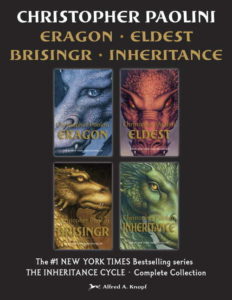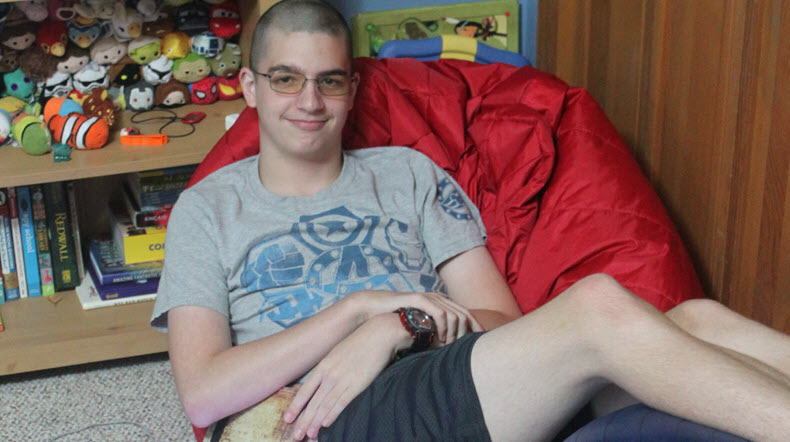Ryan is starting eighth grade at Swift Creek Middle School in Tallahassee, Florida. In first grade, he was diagnosed with dyslexia. Two years ago he became a Bookshare member and has read close to fifty books since then. In a recent interview, Ryan and his mother, Tippi, share their advice for students with reading barriers and the parents who support them.
What was reading like before you started using Bookshare and audio narration?
RYAN: I couldn’t enjoy the level of books I wanted to read. While my reading level was only at 2nd–3rd grade, I wanted to read Harry Potter, Percy Jackson, and more advanced books that all my friends were reading. Listening to audiobooks was the only way for me to enjoy those books.
Which reading tools and assistive technology devices do you use?
RYAN: I wear prescription glasses with a special yellow tint. I also use an iPad to have it read to me and help with handwriting issues.
Which features are especially helpful to make reading easier?
RYAN: I am an auditory learner, so listening to text-to-speech narration is always the most effective way for me to learn.
What kinds of books do you like to read? Any favorites?
RYAN: I enjoy science fiction, fantasy, adventure, and Greek mythology. In addition to Harry Potter and Percy Jackson, some of my favorite series are the Kingdom Keepers by Ridley Pearson and The Inheritance Cycle by Christopher Paolini.
What advice do you have for other students who have difficulty reading?
RYAN: Find a genre that you enjoy. Keep looking and try all types of books until you find what you like. Try audiobooks so you can read books above your reading level. Above all, “Never give up, never surrender!” (quote from the movie Galaxy Quest).
Mother Shares Tips on Advocating for Child with Dyslexia
What advice do you have for parents of students with dyslexia?
TIPPI: Keep saying dyslexia; don’t let teachers or specialists try to discount dyslexia as just “a reading or learning disorder.” Dyslexia has specific characteristics, learning styles, organization styles, and social issues. Continue to support and encourage your child. Don’t refer to your child in terms of his learning issue. His identity is not dyslexic. Instead, say, “he has dyslexia.”
Can you share any examples of “I wish I knew then what I know now”?
TIPPI: I wish someone had told us about Bookshare earlier and that using audiobooks is not a cop out. By listening to books Ryan enjoys, it has given him the confidence to try reading those books. He recognizes words in print because he has heard them being used through audiobooks. While reading print is important, don’t let educators discount the importance of listening.
You know your child and what he or she needs. We tried extra reading programs, summer programs, and tutoring. While children with dyslexia do need extra help, don’t forget that they are working twice as hard as everyone else. They need down time, a chance to be a kid, and plenty of fun. It is important to find the balance between pushing and relaxing.
What are some ways you work with teachers and administrators to advocate on Ryan’s behalf?
TIPPI: Once Ryan transitioned to middle school, we found it much easier to work with the teachers and administrators. Elementary school was difficult due to the emphasis on grade promotion and standardized testing, so we homeschooled him for third through fifth grade. Since Ryan had an existing IEP he was able to continue to receive reading help. We were concerned about going back to public school, but within the first nine weeks of sixth grade, we realized that Ryan was going to be able to handle it. The middle school staff is wonderful, and teachers continually suggest ways to make school easier for Ryan.
At the beginning of seventh grade Ryan got an iPad so he could type assignments. During IEP meetings Ryan and I discuss what may help, and his teachers and Exceptional Student Education (ESE) supervisor identify different things to try. Some suggestions work and some don’t, but the staff never gives up.
For example, Ryan is an auditory learner, so taking notes is difficult. While trying to write or type what is being said, Ryan will miss the entire lecture. We tried fill-in-the-blank notes, and while this helped, Ryan was still missing parts due to spelling and grammar issues. Now we get the worksheets ahead of time or have the PowerPoint notes printed for him. This way he can follow along in the notes but continue to listen which is how he learns best.
The Bookshare team thanks Ryan and Tippi for sharing their story.
Bookshare is FREE for qualified U.S. students with reading barriers.


[…] can read the full interview with Tippi and Ryan on the Bookshare […]
[…] can read the full interview with Tippi and Ryan on the Bookshare […]
I appreciate Tippi’s point about not letting teachers diminish dyslexia, one’s child, and that child’s ability. However, I disagree with saying that dyslexia is something that your child has. For me, using the word has implies that someday it could be gone. They will always be dyslexics, they can learn to live with its challenges and learn to soar, but they will always have the challenges. Dyslexia is a part of who our children are, but only one small part of a greater whole.
Michelle: thank you so much for sharing your opinion. We welcome discussion on this topic from parents, teachers and students.
-Laura from Bookshare